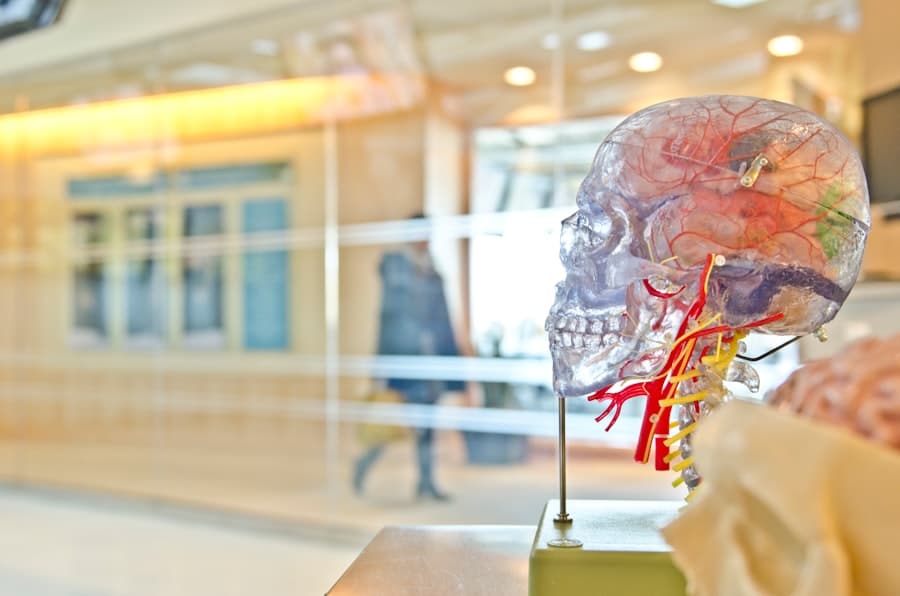Artificial Intelligence (AI) has emerged as a transformative force across various sectors, and mental health care is no exception. The integration of AI into mental health services is reshaping how practitioners understand, diagnose, and treat mental health disorders. Predictive modeling, a subset of AI, leverages vast amounts of data to forecast outcomes and identify patterns that may not be immediately apparent to human analysts.
This approach is particularly valuable in mental health, where the complexity of human behavior and the multifaceted nature of psychological conditions often complicate diagnosis and treatment. The potential of AI in predictive modeling lies in its ability to analyze large datasets, including electronic health records, social media interactions, and even genetic information. By employing sophisticated algorithms, AI can identify risk factors and predict the likelihood of mental health issues developing in individuals or populations.
This capability not only enhances the understanding of mental health disorders but also paves the way for more personalized and effective interventions. As we delve deeper into the role of AI in mental health predictive modeling, it becomes evident that this technology holds promise for improving patient outcomes and revolutionizing mental health care.
Key Takeaways
- AI and predictive modeling have the potential to revolutionize mental health care by analyzing big data and predicting outcomes.
- Machine learning algorithms play a crucial role in predicting mental health outcomes by analyzing various factors and patterns.
- Ethical considerations are important when using AI for predictive modeling in mental health to ensure privacy and avoid bias.
- AI has the potential to improve the diagnosis and treatment of mental health disorders by providing more accurate and personalized insights.
- Despite its potential, AI in predictive modeling for mental health faces challenges and limitations such as data quality and interpretability.
The Role of AI in Analyzing Big Data for Mental Health Predictive Modeling
Identifying Trends and Patterns
AI algorithms can analyze patterns in patient histories, treatment responses, and demographic information to identify trends that may indicate a higher risk for certain mental health conditions.
Analyzing Social Media Data
One notable application of AI in mental health is the analysis of social media data. Researchers have begun to explore how online behavior can serve as an indicator of mental health status. By analyzing posts, comments, and interactions on platforms like Twitter or Facebook, AI can detect linguistic patterns and emotional cues that may signal depression, anxiety, or other disorders.
Enhancing Predictive Models and Interventions
The ability to analyze big data through AI enhances the precision of predictive models, enabling more proactive and targeted interventions. This innovative approach not only broadens the scope of data available for predictive modeling but also allows for real-time monitoring of mental health trends within communities.
The Use of Machine Learning Algorithms in Predicting Mental Health Outcomes

Machine learning algorithms are at the forefront of predictive modeling in mental health, offering sophisticated techniques for analyzing complex datasets. These algorithms can learn from historical data to identify patterns and make predictions about future outcomes. For example, supervised learning algorithms can be trained on labeled datasets where the outcomes are known, allowing them to recognize features associated with specific mental health conditions.
Once trained, these models can then be applied to new patient data to predict the likelihood of developing similar issues. A practical example of machine learning in action is the use of logistic regression models to predict suicide risk among patients with depression. By analyzing various factors such as previous suicide attempts, family history, and current stressors, these models can provide clinicians with valuable insights into which patients may require more intensive monitoring or intervention.
Additionally, unsupervised learning techniques, such as clustering algorithms, can help identify subgroups within a population that share similar characteristics or risk factors, further refining the predictive capabilities of mental health assessments.
Ethical Considerations in Using AI for Predictive Modeling in Mental Health
While the potential benefits of AI in predictive modeling for mental health are significant, ethical considerations must be carefully navigated. One primary concern is the issue of privacy and data security. Mental health data is inherently sensitive, and the use of AI necessitates stringent measures to protect patient confidentiality.
Ensuring that data is anonymized and securely stored is paramount to maintaining trust between patients and healthcare providers.
If the training data used to develop these models is not representative of diverse populations, the resulting predictions may disproportionately affect certain groups.
For instance, if an algorithm is primarily trained on data from one demographic group, it may not accurately predict outcomes for individuals from different backgrounds. This raises questions about fairness and equity in mental health care delivery. Addressing these ethical challenges requires ongoing dialogue among stakeholders, including clinicians, ethicists, and technologists, to establish guidelines that prioritize patient welfare while harnessing the power of AI.
The Impact of AI on Improving Diagnosis and Treatment of Mental Health Disorders
AI’s integration into mental health care has the potential to significantly enhance both diagnosis and treatment processes. By providing clinicians with advanced tools for analysis and prediction, AI can facilitate earlier detection of mental health disorders. For example, predictive models can help identify individuals at risk for conditions such as bipolar disorder or schizophrenia long before they exhibit severe symptoms.
Early intervention is crucial in mental health care; timely treatment can lead to better long-term outcomes for patients. In terms of treatment personalization, AI can assist in tailoring interventions based on individual patient profiles. By analyzing data from previous treatment outcomes, AI systems can recommend specific therapeutic approaches that have been effective for similar patients.
This level of customization not only improves patient engagement but also increases the likelihood of successful treatment outcomes. For instance, if a predictive model indicates that a patient with anxiety responds well to cognitive-behavioral therapy (CBT), clinicians can prioritize this approach over others that may be less effective for that individual.
Challenges and Limitations of AI in Predictive Modeling for Mental Health

Data Quality and Availability
Effective predictive modeling relies on large datasets that are both comprehensive and accurate. However, many mental health records are incomplete or inconsistent due to variations in documentation practices across different healthcare systems. This lack of standardized data can hinder the development of robust predictive models.
Interpretability of AI Algorithms
Additionally, there is a challenge related to the interpretability of AI algorithms. Many machine learning models operate as “black boxes,” meaning their decision-making processes are not easily understood by humans. This lack of transparency can be problematic in clinical settings where clinicians need to justify their decisions based on model predictions.
Fostering Trust in AI-Driven Predictive Modeling
If a model suggests a particular treatment plan but cannot explain why it arrived at that conclusion, clinicians may be hesitant to rely on its recommendations. Bridging this gap between complex algorithms and clinical understanding is essential for fostering trust in AI-driven predictive modeling.
The Future of AI in Supporting Predictive Modeling for Mental Health
Looking ahead, the future of AI in supporting predictive modeling for mental health appears promising yet complex. As technology continues to evolve, we can expect advancements in natural language processing (NLP) that will enhance the ability to analyze unstructured data sources such as clinical notes or patient narratives. Improved NLP capabilities could lead to more nuanced understanding and prediction of mental health conditions based on language use and emotional expression.
Moreover, the integration of wearable technology into mental health monitoring presents exciting opportunities for real-time data collection and analysis. Devices that track physiological indicators such as heart rate variability or sleep patterns could provide valuable insights into an individual’s mental state. By combining this real-time data with existing predictive models, clinicians could gain a more holistic view of their patients’ well-being and adjust treatment plans accordingly.
The Potential of AI in Revolutionizing Mental Health Care
The potential of AI in revolutionizing mental health care cannot be overstated. Through advanced predictive modeling techniques, AI offers new avenues for understanding complex psychological conditions and improving patient outcomes. While challenges remain—particularly concerning ethical considerations and data quality—the ongoing development of AI technologies holds promise for enhancing diagnosis and treatment processes within the field.
As we continue to explore the intersection of technology and mental health care, it is crucial to prioritize ethical practices and ensure that advancements benefit all individuals equitably. By fostering collaboration among researchers, clinicians, and technologists, we can harness the power of AI to create a more effective and compassionate mental health care system that meets the needs of diverse populations. The journey toward integrating AI into mental health care is just beginning; its potential impact on improving lives is profound and far-reaching.
In a related article from TechRepublic, IT decision-makers can identify technologies that support predictive modeling in mental health. This article provides valuable insights into the various tools and software available to create predictive models for mental health outcomes. To learn more about the best software to create training videos for mental health professionals, check out this article.
FAQs
What is predictive modeling in mental health?
Predictive modeling in mental health involves using data and statistical algorithms to predict outcomes such as the likelihood of developing a mental health disorder, the effectiveness of a particular treatment, or the risk of relapse.
How is AI supporting predictive modeling in mental health?
AI is supporting predictive modeling in mental health by analyzing large datasets to identify patterns and trends that can help predict mental health outcomes. AI algorithms can also be used to develop predictive models that can assist in early intervention and personalized treatment plans.
What are the benefits of using AI for predictive modeling in mental health?
Using AI for predictive modeling in mental health can lead to more accurate predictions, early identification of mental health issues, personalized treatment plans, and improved patient outcomes. It can also help in identifying high-risk individuals and allocating resources more effectively.
Are there any ethical considerations when using AI for predictive modeling in mental health?
Yes, there are ethical considerations when using AI for predictive modeling in mental health, such as ensuring patient privacy and data security, addressing potential biases in the data and algorithms, and obtaining informed consent for using personal data for predictive modeling purposes.
What are some examples of AI applications in predictive modeling for mental health?
Some examples of AI applications in predictive modeling for mental health include using natural language processing to analyze text data from therapy sessions or social media posts, using machine learning algorithms to predict the risk of suicide or self-harm, and using predictive analytics to identify individuals at risk for developing mental health disorders.

